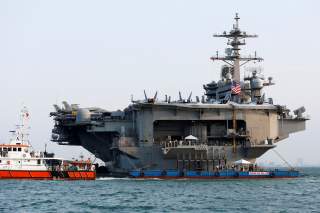China Says U.S. Carrier's Vietnam Visit Was a 'Waste of Money'
Beijing reminded Vietnam that it could militarize the disputed Spratly Islands “overnight” if it opted to do so.
US aircraft carrier Carl Vinson has been in Vietnamese waters off the port city of Da Nang since Monday, marking the first port call by a US carrier to the Southeast Asian nation since the Vietnam War.
Da Nang was a major US staging area during the war.
Also in the nuclear-powered Nimitz-class carrier’s strike group are two escort ships, cruiser USS Lake Champlain and destroyer USS Wayne E Meyer.
Top leaders from the United States and Vietnam discussed the possibility of an aircraft-carrier visit last year as part of an effort to further defense relations, the US Third Fleet’s command and control said in a statement.
Hanoi and Washington have been careful not to link the symbolic visit, part of a scheduled deployment in the Indo-Pacific region, to Beijing’s adamant claims of sovereignty over islets and atolls in the South China Sea, but ironically it is disapproving Chinese media that have been tracking the slew of exchanges taking place throughout the carrier’s five-day visit.
Recommended: America’s Battleships Went to War Against North Korea
Recommended: 5 Places World War III Could Start in 2018
Recommended: How North Korea Could Start a War
Beijing’s displeasure was inevitable, but its official response has been that the trip is unlikely to stir up trouble in the South China Sea.
“The South China Sea may be a good place to flex muscles, but it is primarily comprehensive strength that shapes the geopolitics there.… The US is free to send warships to the South China Sea, like the ongoing visit by Carl Vinson, which will only waste money,” said an op-ed in the party mouthpiece People’s Daily on Wednesday.
Even as US-Vietnamese military cooperation is being lifted to a new level, it “won’t embolden Hanoi to act as a US outpost to confront Beijing,” said the article, as it has long been Hanoi’s strategic vision to “simultaneously develop ties with Beijing and Washington.”
China’s Foreign Ministry said no country wanted geopolitical turbulence and the region had gradually “sorted out its thoughts” in handling disputes after an international arbitration initiated by Manila ruled in favor of the Philippines, which Beijing shunned at the outset.
That said, China Daily acknowledged the concern that Hanoi may be tempted to use its amicable ties with Washington as leverage to drum up resistance to Beijing’s increasing sway in the South China Sea, now that the ideological camaraderie between the two communist regimes has become thinner than ever and now that Hanoi has been fighting a lone battle after Manila became reconciled with Beijing last year.
Still, the strain is more “at the psychological level” and will not have any effect if “Beijing ignores it,” said the op-ed, adding that Beijing has the capability of “militarizing the cays, reefs and shoals of the Nansha Islands overnight.”
The Nansha archipelago is more commonly known as the Spratly Islands, which are subject to conflicting claims by Hanoi and Beijing.
Carl Vinson’s crew will share with their Vietnamese counterparts technical expertise in water and electricity supply, response to disasters, and personnel training on aircraft and in several local venues before leaving Vietnam on Friday, according to VietNamNet Online.
This article originally appeared on Asia Times.
Image: Reuters

